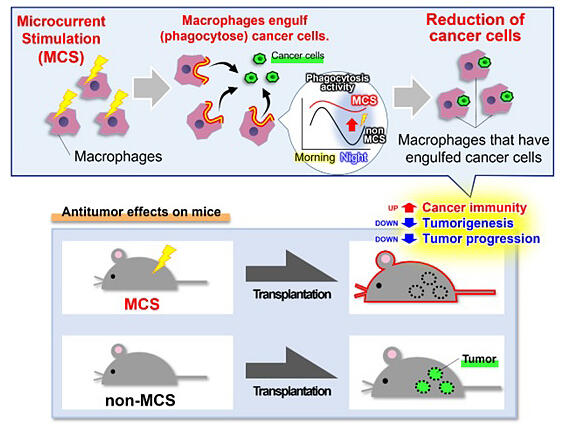A research group led by Assistant Professor Yuya Yoshida, Specially Appointed Professor Shigehiro Ohdo, and Professor Naoya Matsunaga of the Faculty of Pharmaceutical Sciences at Kyushu University has demonstrated that microcurrent stimulation can activate macrophage-mediated cancer immunity. The results were published in Theranostics.

Provided by Kyushu University
Macrophages phagocytize cancer cells and also activate other immune cells. Normally, the phagocytic activity of macrophages in mice decreases at night. The research group has shown that microcurrent stimulation changed the level of a molecule called the clock gene PERIOD1 in macrophages, eliminating the time during which the phagocytic ability is reduced.
Matsunaga said, "This research began in 2017 when I accidentally discovered that clock genes in the spleen were expressed when a microcurrent is applied to the abdomen of mice."
The research group demonstrated that metastasis was actually suppressed in mice in which cancer cells from breast, liver, ovarian, and colon cancers and melanoma were transplanted and grown. The activation of macrophages was also confirmed with various types of human cancer cells.
Yoshida commented, "We verified the results under various conditions, such as stimulating once daily for several days." The research team established a Kyushu University venture, chicktek, in 2021 and is currently developing a microcurrent stimulator for pets to improve cognitive and other functions.
Matsumoto added, "Moving forward, we will continue to study various aspects of this technology with the hope of putting it to practical use as a medical device."
Journal Information
Publication: Theranostics
Title: Targeting macrophage circadian rhythms with microcurrent stimulation to activate cancer immunity through phagocytic defense
DOI: 10.7150/thno.100748
This article has been translated by JST with permission from The Science News Ltd. (https://sci-news.co.jp/). Unauthorized reproduction of the article and photographs is prohibited.




